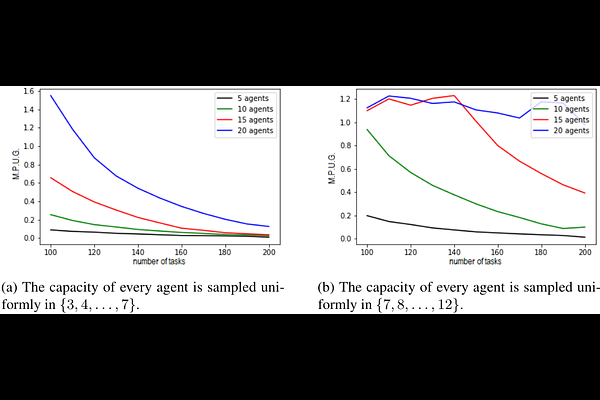Edge Manipulations for the Maximum Vertex-Weighted Bipartite b-matching

Edge Manipulations for the Maximum Vertex-Weighted Bipartite b-matching
Gennaro Auricchio, Qun Ma, Jie Zhang
AbstractIn this paper, we explore the Mechanism Design aspects of the Maximum Vertex-weighted $b$-Matching (MVbM) problem on bipartite graphs $(A\cup T, E)$. The set $A$ comprises agents, while $T$ represents tasks. The set $E$ is the private information of either agents or tasks. In this framework, we investigate three mechanisms - $\MB$, $\MD$, and $\MG$ - that, given an MVbM problem as input, return a $b$-matching. We examine scenarios in which either agents or tasks are strategic and report their adjacent edges to one of the three mechanisms. In both cases, we assume that the strategic entities are bounded by their statements: they can hide edges, but they cannot report edges that do not exist. First, we consider the case in which agents can manipulate. In this framework, $\MB$ and $\MD$ are optimal but not truthful. By characterizing the Nash Equilibria induced by $\MB$ and $\MD$, we reveal that both mechanisms have a Price of Anarchy ($PoA$) and Price of Stability ($PoS$) of $2$. These efficiency guarantees are tight; no deterministic mechanism can achieve a lower $PoA$ or $PoS$. In contrast, the third mechanism, $\MG$, is not optimal, but truthful and its approximation ratio is $2$. We demonstrate that this ratio is optimal; no deterministic and truthful mechanism can outperform it. We then shift our focus to scenarios where tasks can exhibit strategic behaviour. In this case, $\MB$, $\MD$, and $\MG$ all maintain truthfulness, making $\MB$ and $\MD$ truthful and optimal mechanisms. In conclusion, we investigate the manipulability of $\MB$ and $\MD$ through experiments on randomly generated graphs. We observe that (1) $\MB$ is less prone to be manipulated by the first agent than $\MD$ (2) $\MB$ is more manipulable on instances in which the total capacity of the agents is equal to the number of tasks (3) randomizing the agents' order reduces the agents' ability to manipulate $\MB$.